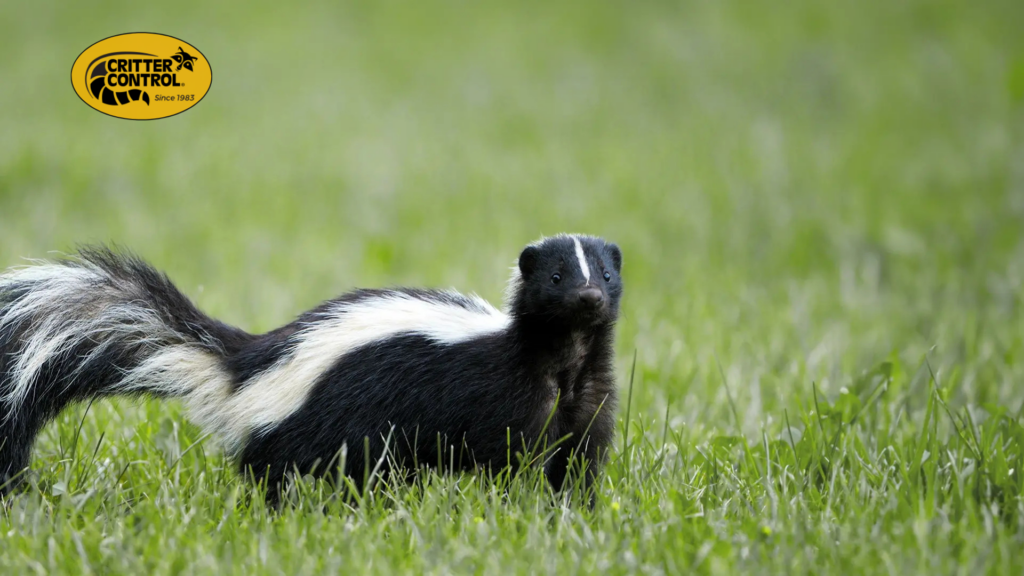Understanding Skunk Behavior and Why They Invade Properties
Skunks are nocturnal animals known for their distinctive black-and-white fur and their powerful defensive spray. While they play an essential role in controlling insect populations, their presence on your property can lead to several issues, including property damage and unpleasant odors. Understanding skunk behavior is crucial in implementing effective removal strategies.
Signs of a Skunk Infestation
Skunks are generally reclusive, but several telltale signs indicate their presence:
- Strong, pungent odor – The most obvious sign of a skunk problem is the unmistakable stench of their spray.
- Shallow holes in the yard – Skunks dig small holes in search of grubs and other insects.
- Skunk tracks and droppings – Their footprints have five toes with visible claw marks, and their droppings resemble those of a cat but may contain insect parts.
- Nocturnal activity – Seeing skunks at night around trash cans or gardens suggests they have made your property their home.
Dangers of Having Skunks on Your Property

Although skunks are not aggressive animals, their presence can pose multiple risks:
- Unpleasant Odor: Skunks spray when they feel threatened, and the smell can linger for weeks.
- Property Damage: Skunks dig burrows under decks, porches, and sheds, causing structural issues.
- Disease Transmission: Skunks are known carriers of rabies and can also spread diseases like leptospirosis and distemper.
- Pet Encounters: Dogs and cats are often sprayed, leading to distress and the need for immediate decontamination.
Humane Ways to Remove Skunks from Your Property
1. Eliminate Attractants
The first step in skunk removal is to make your property less inviting:
- Secure trash cans with tight-fitting lids.
- Remove pet food left outside overnight.
- Keep gardens clean of fallen fruits and vegetables.
- Eliminate standing water sources.
2. Use Natural Deterrents
Certain odors and natural substances can deter skunks:
- Citrus peels: Skunks dislike strong citrus scents.
- Ammonia-soaked rags: The smell mimics the presence of predators.
- Predator urine: Fox or coyote urine, available in garden stores, can help keep skunks away.
- Motion-activated lights or sprinklers: Skunks are nocturnal and will avoid well-lit or active areas.
3. Seal Off Entry Points
To prevent skunks from nesting under your home or shed:
- Inspect your property for burrows or holes.
- Seal openings with steel mesh or hardware cloth.
- Install a one-way exclusion door to allow skunks to leave but not re-enter.
- Check regularly to ensure no skunks are trapped inside before sealing the area completely.
4. Live Trapping and Relocation
If skunks are already residing on your property, trapping and relocation may be necessary:
- Use a humane live trap with bait such as canned fish, peanut butter, or cat food.
- Place the trap in high-activity areas and cover it with a cloth to reduce stress on the skunk.
- Check local wildlife regulations, as relocating skunks may require special permits.
- Carefully transport and release the skunk at least 10 miles away in a suitable habitat.
5. Professional Wildlife Control Services
For persistent skunk problems, contacting a wildlife control expert is the safest and most effective solution. Professionals have the necessary equipment and experience to remove skunks humanely and implement long-term prevention measures.
Preventing Future Skunk Infestations
Once the skunks are removed, taking proactive steps will help keep them from returning:
- Fence off vulnerable areas: A buried fence (at least 12 inches deep) around decks, sheds, and gardens can prevent skunks from digging.
- Install motion-activated deterrents: These devices can scare away skunks before they settle on your property.
- Regular property inspections: Periodically check for signs of skunk activity and take immediate action if necessary.
Frequently Asked Questions
1. How can I remove skunk odor from my property? Mix one quart of hydrogen peroxide, a quarter cup of baking soda, and a teaspoon of dish soap. Use this solution to neutralize skunk spray on pets, clothing, and surfaces.
2. Is it legal to trap and relocate skunks? Laws regarding skunk removal vary by location. Check with local wildlife authorities before trapping or relocating skunks.
3. Will skunks attack humans? Skunks are generally non-aggressive and will only spray when threatened. However, they can carry diseases like rabies, so avoid direct contact.
4. What should I do if I find a baby skunk on my property? If you find a baby skunk alone, monitor from a distance. The mother may return. If abandoned, contact a wildlife rehabilitator for assistance.
5. Can skunks climb fences? Skunks are not good climbers but can dig under fences. To prevent entry, install fencing that extends at least 12 inches underground.
Contact Us for Professional Skunk Removal Services
If you’re dealing with a skunk problem, let our expert team at Critter Control San Jose help. We specialize in humane wildlife removal, ensuring your home stays skunk-free. Contact us today for a consultation and safe skunk removal solutions.




